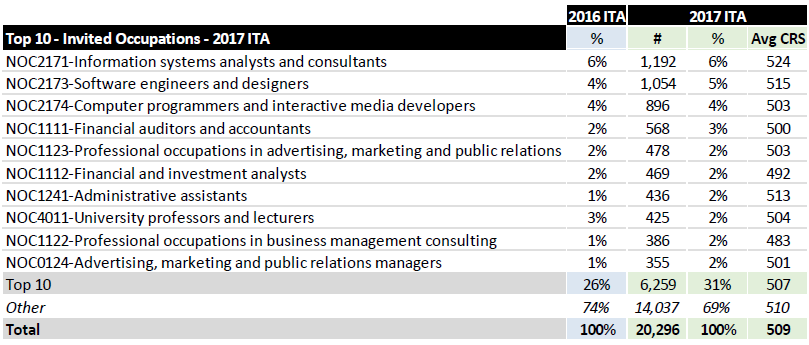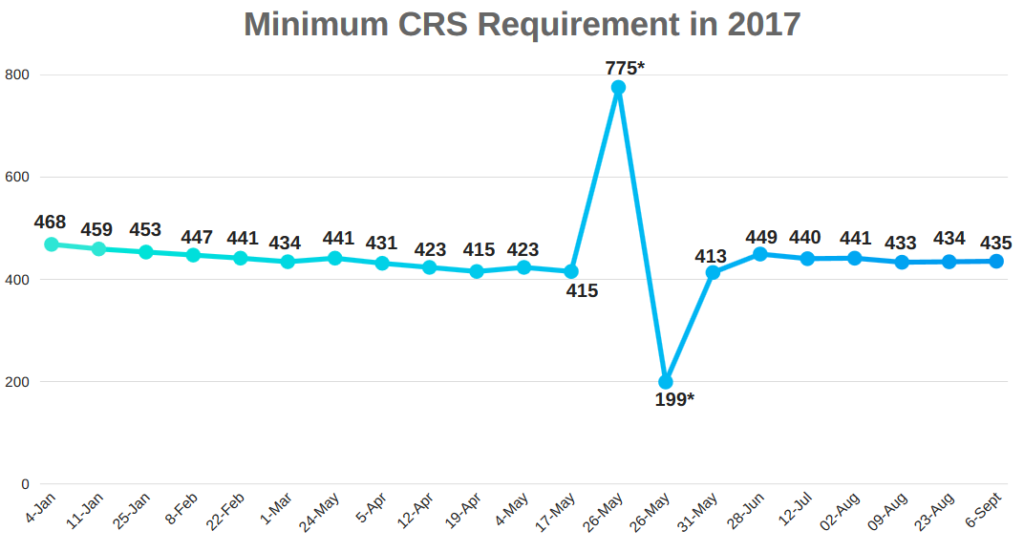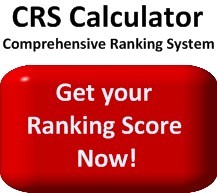Express Entry Reforms in 2016 Led to More Candidates Invited Based on Human Capital Factors
Improvements made to Canada’s Express Entry immigration selection system last November led to far more candidates being issued an Invitation to Apply (ITA) for permanent residence based on their human capital factors alone, without needing to obtain additional points for factors such as obtaining a job offer or a provincial nomination.
Prior to the set of reforms that came into effect on November 19, 2017, around three-in-five (62 percent) of invited candidates had sufficient point totals under the Comprehensive Ranking System (CRS) to receive an ITA based on human capital alone. Over the period from November, 2016 to February, 2017, however, this share increased to 90 percent.
This fact is just one of many contained in a presentation that was put together by senior staff at Immigration, Refugees and Citizenship Canada (IRCC) last spring. Importantly, the information revealed that more candidates outside Canada, specifically those eligible under the Federal Skilled Worker Class (FSWC), were being invited to apply than previously following the changes made last November.
It was also found that more candidates in the Natural and Applied Sciences (including STEM occupations) were being invited to apply, with 35 percent of those invited between November and February being in these occupations, up from 28 percent. Meanwhile, the share of candidates in lower skilled occupations being invited decreased from 11 percent to three percent.
Informational Technology (IT) workers in particular have benefited from recent changes to Express Entry, with the number of candidates with IT work experience being invited to apply having increased over time.

Source: IRCC
The cause and effect of the changes
In making the changes last November, IRCC stated its renewed goal to put greater weight on human capital, skills, and experience. Feedback from stakeholders had suggested that the 600 additional CRS points for a qualifying job offers was distorting the balance with human capital. Consequently, to strike a better balance between labour market responsiveness and immigrant outcomes IRCC reduced the value of a job offer significantly. A job offer is now worth 200 points if the offer is in an occupation contained in a Major Group 00 of the National Occupational Classification, or 50 points for a job offer in any other skilled position.
Secondly, to ensure that more former international graduates are invited to apply, IRCC allocated up to 30 CRS points to candidates who had studied in Canada. According to IRCC, these reforms resulted in 46 percent of ITAs being issued to former international students over the period from November to February (up from 31 percent before the reforms), thus facilitating smoother pathways to permanent residence for former international students.
Jobs
When IRCC made the changes to the number of points available for a job offer, it also expanded the range of candidates who could be awarded these points. Some job offers that are not supported by a Labour Market Impact Assessment (LMIA) are now also being awarded points for the first time. These include workers in Canada on a NAFTA work permit or as an Intra-Company transferee. In these non-LMIA cases, the worker must have been working in Canada for at least one year and the job offer must be made by the same employer named on the work permit.
In addition, the job offer duration requirement also changed from ‘indeterminate’ to at least one year in duration, allowing employers in contract-based industries to recruit through Express Entry more easily.
Early results from these changes show that 65 percent of invited candidates with a job offer benefitted from a LMIA exemption under the improved system.
Approval rate
Interestingly, the IRCC presentation also provides information on what portion of ITAs issued end up in an application being submitted and approved.
In the first two years of Express Entry, around 47,000 applications for permanent residency were received. About 85 percent of invitations result in an application, and of the complete applications that make it to the final decision stage, the approval rate is 97 percent. Consequently, in the majority of cases the issuance of an ITA results in the invitee being approved to become a permanent resident of Canada.
Later changes
The data contained in the presentation precedes other changes made to Express Entry that came into effect on June 6, 2017. These changes introduced, for the first time, additional points being awarded to candidates with a sibling in Canada. Candidates with French ability also received additional points following those changes.
2017 a breakout year
The presentation largely discusses the effect of changes in percentage terms, but it is important to remember that the overall number of ITAs being issued since late 2016 has increased significantly. Of the 131,394 ITAs that have been issued since Express Entry was first launched in January, 2015, 66,549 have been issued so far in 2017. This is significantly more than the total number issued in all of last year.
According to IRCC, this has had the effect of reducing the CRS cut-off threshold, which reached a low of 413 on May 31.
To learn more about Express Entry in 2017, read our Canada Day Special Report.

*Note: Draws of May 26 invited provincial nominees with a minimum CRS score of 775, and candidates in the Federal Skilled Trades Class with a minimum score of 199.
FSW candidates benefit
As the CRS cut-threshold drops, more candidates from outside Canada are being invited to apply, increasing the proportion of candidates invited under the FSWC.
Unless a candidate has worked in Canada for at least a year or has experience in a trade occupation, he or she will be classified as a FSWC candidate.
“As more skilled workers are invited to apply based on IRCC’s objectives, the diversity of candidates who may ultimately be invited and approved to begin living and working in Canada expands,” notes Attorney David Cohen.
“Though the future cannot be predicted, IRCC has been quite clear that it is looking to welcome individuals and families from around the world who can settle into Canadian society over the long term, not just on the basis of their immediate economic impact. Consequently, people who share that vision and who want to benefit from what amounts to a generous, liberal immigration policy in Canada are advised to create an Express Entry profile and take proactive steps to improve their chances of being invited to apply.”
 The CRS Calculator
The CRS Calculator
Readers can use the new and improved CRS Calculator to find out what their score would be under the CRS after recent changes came into effect.
To find out if you are eligible to immigrate to Canada permanently, fill out a free online assessment form.
© 2017 CICNews All Rights Reserved
- Do you need Canadian immigration assistance? Contact the Contact Cohen Immigration Law firm by completing our form
- Send us your feedback or your non-legal assistance questions by emailing us at media@canadavisa.com







